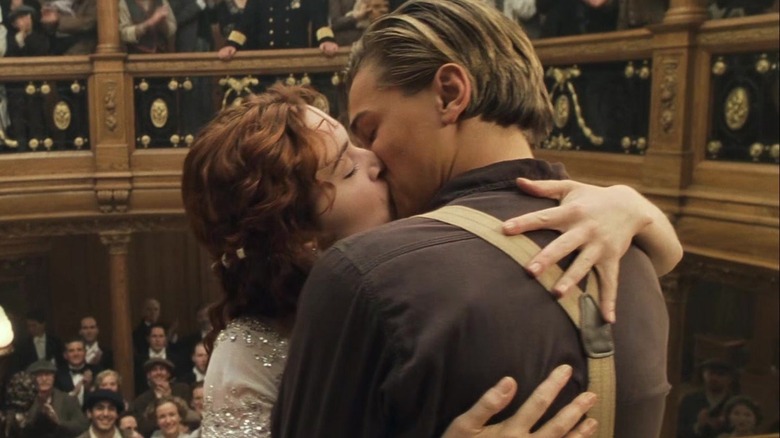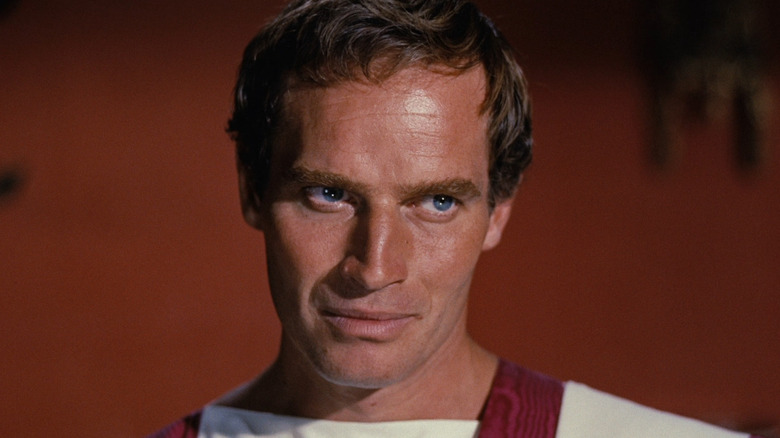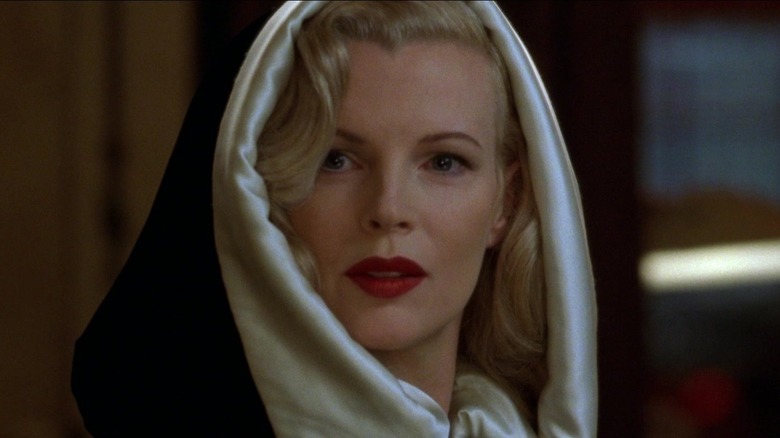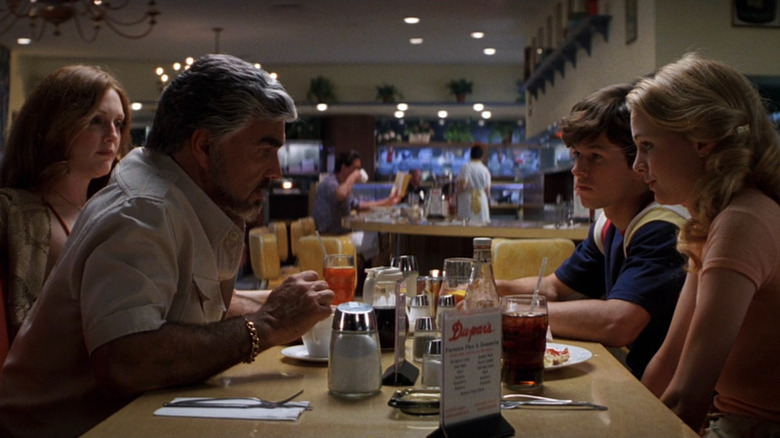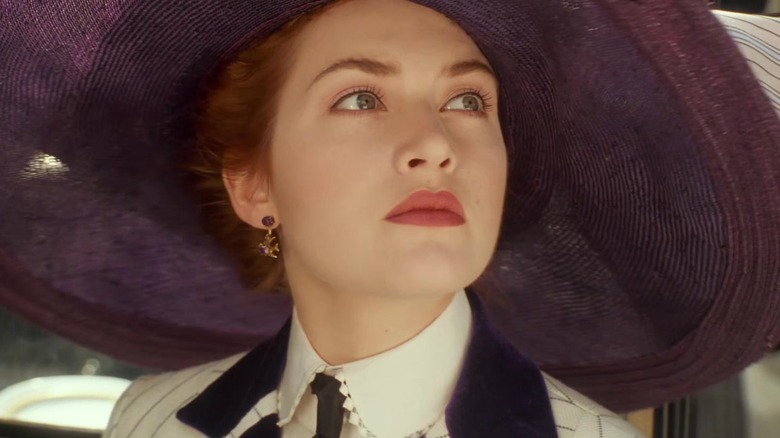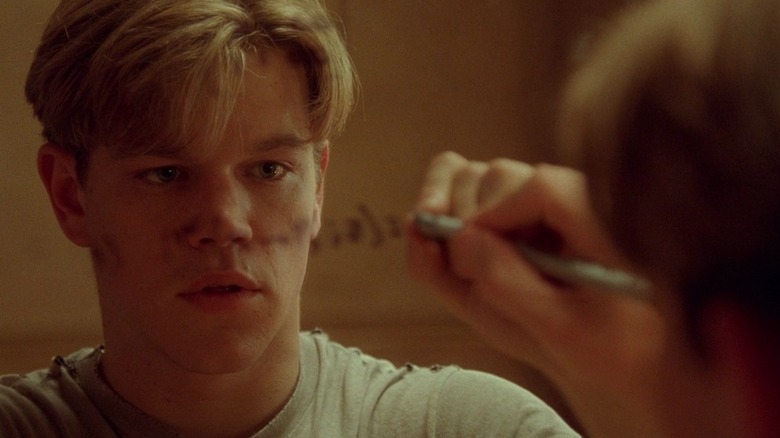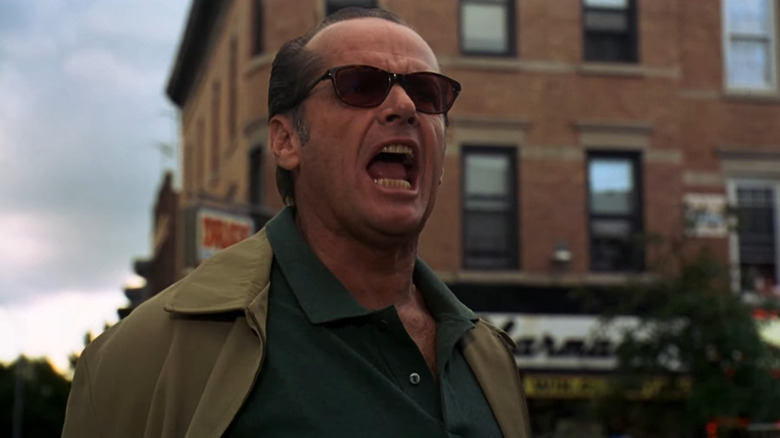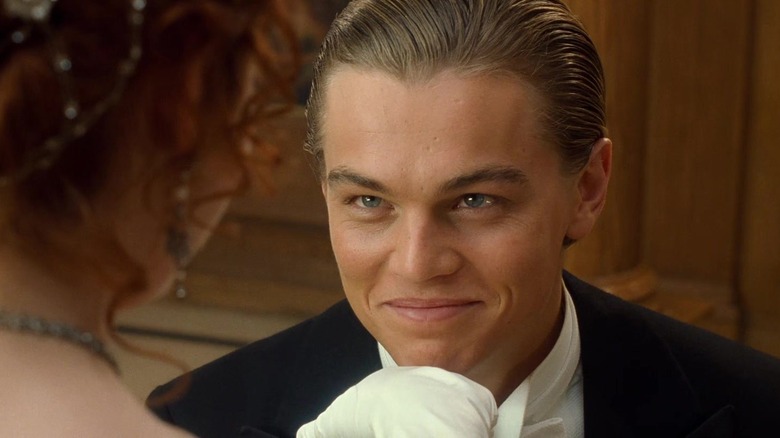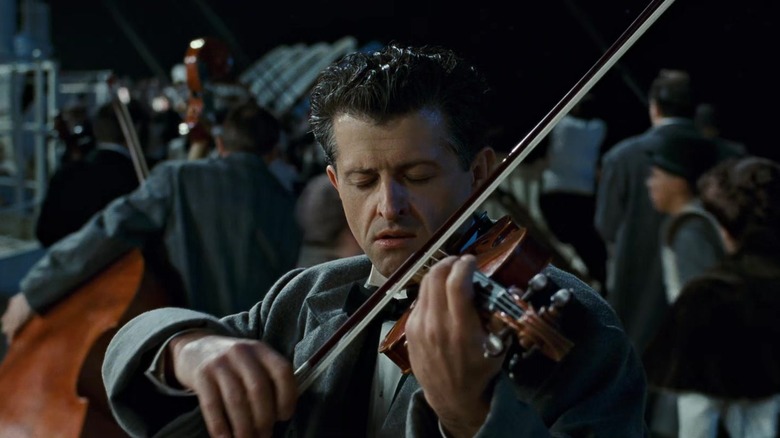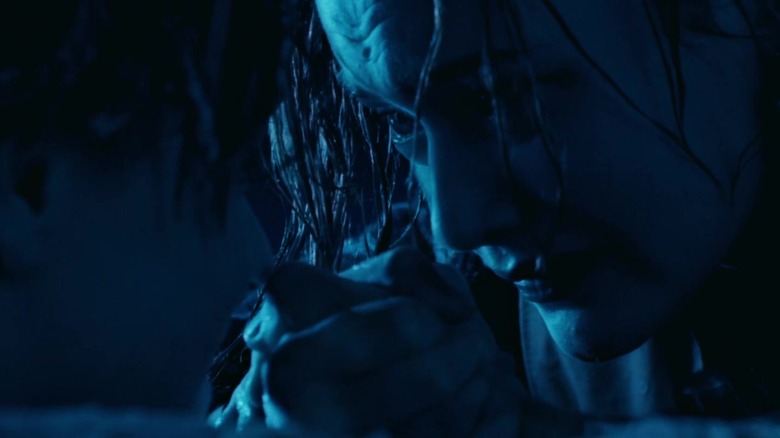Did Titanic Deserve To Sweep The Oscars 25 Years Ago? An Investigation
(Welcome to Did They Get It Right?, a series where we take a look at an Oscars category from yesteryear and examine whether the Academy's winner stands the test of time.)
For a lot of millennials, the 1998 Academy Awards hold a very special place in their hearts. It was the first Oscars ceremony that many paid attention to and were invested in. Ultimately, the ceremony racked up 55.8 million viewers, which no other ceremony before or since has topped. All of this fervor can be attributed to one singular title: "Titanic." James Cameron's epic romantic disaster film was a cultural phenomenon rarely seen before, becoming the highest-grossing film of all time. Not only was it the first film to cross $1 billion worldwide, ending up with a whopping $1.84 billion total, about $900 million more than the next closest title (Steven Spielberg's "Jurassic Park").
People were obsessed with the film, the actors, the special effects, and the music. Every element of that movie birthed a generation of cinema lovers, and they wanted to see that film win a slew of Academy Awards. And they were not disappointed. "Titanic" received a record-tying 14 nominations, and it ended up with an also record-tying 11 wins, making it the only film to hold both records. Upon winning Best Director, James Cameron took a line from his own movie and proclaimed that he was "king of the world." And he was.
Oscars sweeps are a double-edged sword. On one hand, it puts you in the record books. On the other, it cuts out the opportunity to award a bunch of other eligible films, and 1997 contained quite a lot of tremendous pictures. Removed from the cultural dominance, "Titanic" isn't the obvious awards juggernaut you'd think. Maybe spreading the love would've been fine.
What it takes to sweep
Only three movies have ever won 11 Academy Awards: William Wyler's 1959 Roman epic "Ben-Hur," Peter Jackson's 2003 trilogy capper "The Lord of the Rings: The Return of the Thing," and, of course, "Titanic." These three movies share quite a lot in common. All of them are massively budgeted action spectacles. All of them were far and away the highest-grossing films of their respective years. While lately box office has not exactly equated to Oscar success, sometimes a film becomes such a massive cultural touchpoint that people from every corner of the industry must pay their respects to the achievement.
The place to rack up the awards total comes mostly in the below-the-line crafts categories. Though they aren't as star-studded as the acting categories, these are the places where these impressive feats of filmmaking can get their due, earning wins for their cinematography, production design, special effects, music, costumes, and more. When a film has the money to achieve these results that stun even the most seasoned cinema professionals, they can't help but give them awards for it. In fact, "Titanic" and "The Return of the King" were able to reach these massive win totals without even winning a single acting category ("Ben-Hur" scored two wins there). For these three films, the filmmaking craft is directly in your face, and it's much harder for a lower-key film to obviously wow in those departments. Only a film like "Titanic" would have the opportunity to dominate at the Academy Awards like this, and it's even more difficult to actually pull it off in the end, which they did.
Examining the competition
1997 was a jam-packed year when it came to high-quality movies. "Titanic" may have swept through the competition, but it's not like that competition wasn't formidable. Taking a look at just the Best Picture nominees, there's a lot to love. The "cool" choice that year for moviegoers was Curtis Hanson's fantastic noir "L.A. Confidential." For those turned off by the open-hearted, broad earnestness of "Titanic," this was the perfect antidote. "L.A. Confidential" is moody, hard-edged, and a deeply cynical look at Hollywood and police corruption. It also brought to the attention of America for the first time in a major way both Russell Crowe and Guy Pearce, each of whom deliver star-making performances.
On the more emotional side, you had Gus Van Sant's "Good Will Hunting," which I still consider his best work. Like "L.A. Confidential," it made movie stars out of Matt Damon and Ben Affleck and gave Robin Williams the perfect vehicle to reach the dramatic heights he had been striving to reach for years. Also on the emotional side of things, you had the ultimate uplifting indie success story with "The Full Monty," the British male stripper comedy that made over $250 million worldwide.
Finally, there was "As Good As It Gets." James L. Brooks' first two films were full-fledged Oscar darlings, especially "Terms of Endearment" which won him Best Picture, Director, and Screenplay for his debut feature. He had a stumble in the early '90s with the truly awful "I'll Do Anything," but "As Good As It Gets," starring Jack Nicholson and Helen Hunt, was a return to form for Brooks, delivering a character dramedy that earned a whopping $314 million worldwide. And these are just the films that got nominated for Best Picture.
On the outside, looking in
Naturally, people will quibble with the Best Picture nominees we did get — maybe thinking "The Full Monty" was too flimsy or "Good Will Hunting" too maudlin — but I don't think there's a bona fide stinker in that group. But there were plenty of other alternatives that could have made their way into that list of five. With 25 years of hindsight, the clear miss is Paul Thomas Anderson's "Boogie Nights." This was one of our most celebrated American auteurs bursting onto the scene in a major way, quickly establishing himself as a formidable talent behind the camera, and many still consider this to be his best film (for me, that is "There Will Be Blood" or "Phantom Thread"). "Boogie Nights" missed out on Best Picture and Director.
A Best Director nomination that missed out on Picture was Atom Egoyan's "The Sweet Hereafter." Strangely, that film's only other nomination was for Best Adapted Screenplay, which is a pair you don't see too often when nothing else is recognized. Egoyan's drama delves into a lot of heartbreaking tragedy and creates a tapestry of many complex emotional lives. You would've needed much more universal support for that film to get in there, which the lack of nominations demonstrates wasn't there, but it would have been a fitting entry.
Other big films that "Titanic" dethroned included Quentin Tarantino's sole work of adaptation "Jackie Brown," Martin Scorsese's Dalai Lama biopic "Kundun," the under-discussed romantic drama "The Wings of the Dove," and Steven Spielberg's less than stellar "Amistad," which certainly could have won some crafts categories. Ang Lee's "The Ice Storm" wasn't even nominated anywhere! There was plenty to like in 1997 to spread the wealth at the Oscars, but the power of "Titanic" was just too much to ignore.
What Titanic had to win
Of course, how many Oscars you think "Titanic" should've won will come down to personal preference. For as popular as it was, it wasn't to every single person's taste. That being said, this film was a legendarily massive production and James Cameron hired craftspeople at the top of their respective fields to bring their expertise to the project. Without them firing on all cylinders, the chance for "Titanic" to succeed to the degree that it does would be zero.
Chief among these below-the-line categories is Best Visual Effects. The film's blending of computer-generated effects, miniatures, pyrotechnics, water elements, and so many other forms of visual effects truly boggles the mind. There are so many moments in that film I know are miniatures composited into the frame because I have seen the behind-the-scenes footage, yet I do not see a single seam in the final feature.
The other technical categories I cannot dispute "Titanic" winning are the two Best Sound categories. Especially in the film's second half when the ship sinks, the vast array of sound layers and elements immerse the audience so deeply in the drama and never feels like a chaotic barrage of noise, which so many large-scale action pictures feel like today. You would be hard-pressed to find a more complicated task at hand when it came to sound that year, and "Titanic" not only accomplishes it but excels.
The last surefire winner for the film was Best Art Direction. Not only is this a case of period detail, but they had to create this entire ship from the fanciest dining rooms to the grimiest engine room to everything in between. Also, all the sets need to be primed for destruction. A well-deserved award for a remarkable achievement.
Where Titanic had no shot
For as dominant as "Titanic" was at the Oscars, the film was not represented in every category it was eligible for. Most notably, James Cameron wasn't nominated for his screenplay, a rarity for a Best Picture winner. In the 25 years since "Titanic," no other film has won Best Picture without also being nominated for Best Original or Adapted Screenplay, and before "Titanic," you must go all the way back to "The Sound of Music" to find that again. The film quickly garnered a reputation as a technical achievement with a dramatically flimsy backbone (much like his "Avatar" films), and the scapegoat for that was the screenplay. I disagree with the storytelling criticisms. Cameron clearly harnessed the power of archetypes to best suit the classical nature of the film. The story and characters may be simple, but more importantly, they're effective.
The winners of Best Original Screenplay were two up-and-coming actors named Matt Damon and Ben Affleck, who wrote "Good Will Hunting" for themselves to star in. Actors writing their own material could so easily turn into a self-aggrandizing piece about their own talent, but "Good Will Hunting" manages to eschew that and actually be a completely satisfying, emotionally honest story. They proved themselves in front of and behind the camera, and I have no issue with their win.
If I were to pick a winner from that category though, it would be Paul Thomas Anderson for his sophomore feature "Boogie Nights." Anderson — who still hasn't won an Oscar — took the works of Martin Scorsese and Robert Altman, filtered them through the world of porn in the 1970s and '80s, and created a tragicomic epic we still love today. It's one of those films powered by pure ego that somehow isn't destroyed by it too.
Titanic made movie stars, not acting winners
The major place "Titanic" went home empty-handed at the Oscars was in the four acting categories. Unlike Best Original Screenplay, the film actually did receive nominations here. Kate Winslet was recognized for Best Actress and Gloria Stuart in Best Supporting Actress. Notably, Leonardo DiCaprio was not nominated for Best Actor, despite the fact that the film made him a mega movie star and helped create "Leo Mania." The archetypal nature of "Titanic" makes it difficult for the actors to find avenues to play a variety of nuanced colors. The characters here are broad and bold by design, and while the actors understand that and serve the material perfectly, they aren't the kind of performances generally awarded by the Academy.
"As Good As It Gets" was the big acting winner, taking home both Best Actor for Jack Nicholson and Best Actress for Helen Hunt. When he is on his game, writer/director James L. Brooks has the ability to create vibrant, rich, funny characters that any actor salivates to play, directing 10 performances to Oscar nominations over short filmography (with four wins total). Nicholson and Hunt won the Golden Globes and SAG Awards prior to the Oscars, so nobody was going to take them down. The two supporting categories were also pretty cut and dry with Kim Basinger beating out Gloria Stuart for "L.A. Confidential" and Robin Williams taking Best Supporting Actor for "Good Will Hunting."
For as much as I like the cast of "Titanic," they wouldn't be my winners that year either. My favorite performance in the film is Victor Garber's, but I wouldn't put him above Robin Williams, Burt Reynolds for "Boogie Nights," or Robert Forester for "Jackie Brown." Sometimes archetypes are a disadvantage, and I fear that's the case here.
How it got to 11
Because acting and writing were off the table, "Titanic" needed to make up some serious ground below-the-line, which they most certainly did. Along with winning the aforementioned Best Art Direction, Best Visual Effects, Best Sound, and Best Sound Effects Editing categories, the film also took home Best Cinematography, Best Editing, Best Costume Design, Best Original Dramatic Score (this was a year where comedic scores were separate), and, of course, Best Original Song for "My Heart Will Go On."
Some of these wins are incredibly justified. Most obviously for me, it's Best Editing. "Titanic" runs for over three hours, toggles between two different timelines, requires you to keep up with dozens of different characters throughout the ship, and keeps the suspense and momentum at a peak for over an hour of the ship sinking. Conrad Buff, James Cameron, and Richard A. Harris richly deserved that prize.
The most contentious win there is probably Best Cinematography. Russell Carpenter's work on "Titanic" is the kind of bright, glossy look only the highest-budgeted Hollywood productions allow, and if you are into that aesthetic when done right (which I am), it's a visual feast. For others, they may prefer the grittier, less saturated look of Dante Spinotti's cinematography on "L.A. Confidential" or the lush, hazy feeling of Eduardo Serra's work on "The Wings of the Dove." "Boogie Nights" has one of the most dynamic cameras in the last 30 years, and it wasn't even nominated. My winner that year would probably be Frederick Elmes for "The Ice Storm," which wasn't recognized. But the thing everyone agreed upon with "Titanic" was how much of a visual and technical accomplishment it was. Not rewarding how it all was captured would feel very unusual. "Titanic" wasn't ever going to not win these awards.
If I picked the winners
Had I been a voter back in the early months of 1998, pouring over all of the films I had seen in the past year, I still would find myself voting for "Titanic" in many of the categories it ultimately won. Namely, I would give the film Best Picture and Best Director. Every single time I throw on the movie, I truly cannot believe what I am seeing, finding myself overwhelmed all over again by the enormity of the production yet always getting pulled in by the romance at the film's heart (of the ocean). I would also immediately vote for it in seven of the nine other categories it won for.
My two divergences with the Academy on "Titanic" come with Best Cinematography and Best Costume Design. As I mentioned, my Best Cinematography winner would be "The Ice Storm," a film I am still stunned didn't receive one nomination anywhere. For as chilly and drab as that movie feels, I still find so much beauty in every single frame. Kevin Kline carrying Elijah Wood's body down the street is some of the most haunting imagery captured on film in the 1990s.
As for Best Costume Design, I would choose something far wackier and more inventive than the beautiful work done in "Titanic" by Deborah Lynn Scott. My first instinct is to choose "Austin Powers: International Man of Mystery," in which every single character has a distinct look that a person can see in their head the second you name one of them. In a similar vein, "The Fifth Element" would not be too close behind. If the Academy could recognize that "Men in Black" deserved to beat "Titanic" for Best Makeup and Hairstyling, they should have similarly seen this craft in costumes too.
Never let go ... of that record
With the ever-expanding Academy, accomplishing a sweep of the Oscars at the level of "Titanic" will prove to be incredibly difficult. Outside of "The Lord of the Rings: The Return of the King," which obviously tied the win record with 11, the closest a film has come to that number was in 2008 with "Slumdog Millionaire," which won eight. "La La Land" tied "Titanic" for the most Oscar nominations ever, but it only won six awards, infamously not including Best Picture. We have seen giant productions like "Mad Max: Fury Road" and "Dune" crush in below-the-line categories, but that is the extent to which they are recognized. "CODA" won Best Picture last year, and it only won three awards in total.
Reaching an Academy-wide consensus is only going to prove more and more difficult as each year passes. Too many people expect and want different things from the cinema they want to reward in order for one film to come along and rack up 11 wins. "Everything Everywhere All at Once" is the most nominated film this year with 11. We all expect that film to do incredibly well at the ceremony, but even if it won every single category it was nominated for, the most it could get is 10, unless Jamie Lee Curtis and Stephanie Hsu tie in Best Supporting Actress. Of course, the chances of it winning every category also aren't very strong either, as there's plenty of fierce competition in almost every race.
What "Titanic" pulled off at the Oscars is nothing short of astounding. You can quibble with the results and think other films should've won, but like it or not, "Titanic" is in the history books. And I don't see it getting replaced anytime soon.
